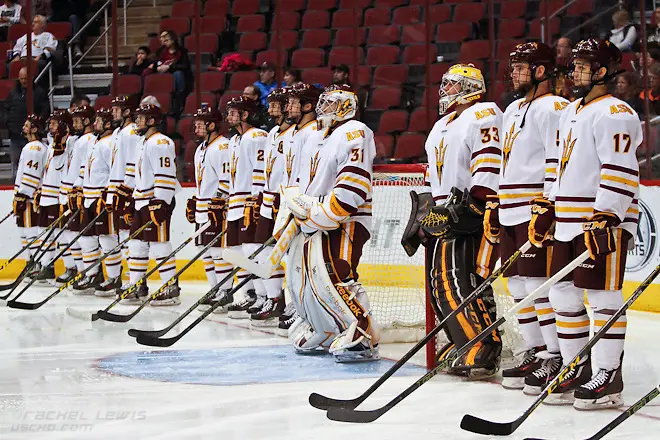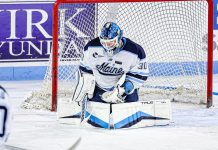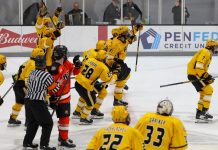
Each week during the season, we look at the big events and big games around Division I men’s college hockey in Tuesday Morning Quarterback.
Jim: Paula, first off Happy Holidays to you and all our readers!
With all but two teams on break this past week, I thought this would be a good time to look back a bit.
For the past week or so, USCHO has been running features that look back at each league over the last decade. It certainly was a pretty wild decade, no doubt.
The seismic shift in the landscape pretty much headlines things for me. The Big Ten was created, the CCHA was demolished and even as we head towards the 2020s, there is still so much uncertainty for the WCHA.
The good news was that college hockey added two teams: Penn State and Arizona State. The better news was that both of those programs were immediately competitive, each qualifying for NCAA tournaments.
Obviously, that was likely the biggest headline of the decade. But as we look back, what are a couple of other storylines that really stand out to you?
Paula: As you mentioned, the biggest story was the realignment – and for me, personally, the shift from covering the CCHA to covering Big Ten hockey.
I don’t think that people who weren’t following either the CCHA or WCHA closely really grasp how enormous a paradigm shift that as. I think the reason people pine for the CCHA still or the old WCHA is that each had a couple of Big Ten schools in its league and there was a such a mix of “big” and “small” programs.
It’s a culture shift that is difficult to explain to fans of other leagues. While I am not calling one bit for a return to something similar, there was something unique about the way in which those two leagues were composed, the way in which each conference had a that mix of B1G schools, smaller D-I schools, and schools at which hockey was the only D-I sport. It was part of the foundation of the entire D-I hockey landscape that we enjoy now, one in which fans can rub elbows with coaches at the Frozen Four. I don’t know how much longer this kind of culture will exist in any D-I sport.
Another storyline that tops my list is the rise of ECAC Hockey. The improvement in that league in the past decade has been phenomenal, from the overall top-to-bottom competition to the league’s presence on the national scene.
From 2000 through 2009, just one ECAC team made a Frozen Four appearance, and that was St. Lawrence in 2000. This past decade saw back-to-back ECAC national titles when Yale won in 2013 and Union the following year. Quinnipiac fought Yale for the title in 2013 and returned to the championship game in 2016. Union first appeared in the Frozen Four in 2012, and Harvard returned to the national championship tournament in 2017 after a 23-year absence. In 2016, Harvard’s Jimmy Vesey was the Hobey Baker Award winner.
This reemergence of ECAC hockey is, in my opinion, one of the best stories of the last decade.
Jim: Mentioning the ECAC is a precursor to my next big storyline: the remarkable number of first-time national champions. Yale and Union were half of the quarter of schools that lifted the national championship trophy.
Minnesota Duluth not only won its first back in 2011, but the Bulldogs followed up with two additional titles in 2018 and 2019. Providence also won its first title in 2015.
To put that all in perspective, six of the 10 national titles in the decade were won by team that entered the 10-year period without a national title.
Not too shabby.
I will pose another question to you, actually two: what was the best team of the decade and who was the best player?
Paula: I think I’d have to go with Minnesota Duluth as the team of the last decade – although “best” is something that can be quantified and qualified in so many different ways. Back-to-back national championships and a presence on the national scene since the start of the decade is a mighty powerful qualifier.
Just look at the way the Bulldogs are following up the shaky start to their season this year after those consecutive titles, too. Now they’re second in the NCHC standings and they’re climbing the PairWise Rankings. Minnesota Duluth is a team that can’t ever be counted out. That is saying something.
Another team that I think deserves recognition is Notre Dame. While still seeking a national title, the Fighting Irish have seven NCAA tournament appearances this decade while competing in three different conferences and three Frozen Four appearances while representing two different conferences. There’s something to be said for their ability to adapt.
As for best player, I’m have what is likely an unpopular choice: Connor Hellebuyck. He only played two seasons in goal with U-Mass but while he was there, he was amazing.
Who’s your team and player, Jimmy?
Jim: Connor Hellebuyck certainly left his mark at UMass Lowell, helping resurrect that program to a point it hadn’t been since the 90s.
I have a difficult time quantifying where he stands given that he never was a Hobey Baker finalist but did win the inaugural Mike Richter Award.
For my pick, I have to go with Johnny Gaudreau. He had great freshman and sophomore campaigns, but was best as a junior when he scored 80 in 40 games. He certainly wasn’t big, but he was such an enjoyable player to watch.
As for my team of the decade, I think I have to go with Minnesota Duluth as well. Three national titles is enough for me to give them the check mark. I did consider Denver, North Dakota and Boston College as well, but none were as clutch in the postseason as were the Bulldogs.
They certainly emerged this decade despite beginning 2010 nowhere near the top of anyone’s list of teams to watch. Do you feel like there is a team that has the potential to come from nowhere to dominate the 20s? It’s not highly likely, but if any team is to be the Duluth of the next decade, might it be Minnesota State? Despite the fact that they are consistently a power, their lack of postseason success probably won’t have them top of mind for most as we head into the next ten years.
Paula: Without question, Minnesota State is a contender for a team to dominate the next decade. They’re not unknown now, but as you said, they haven’t yet reached that next benchmark of being a consistent presence post-season, and they have worked hard to get to that next point. The Mavericks certainly appear to be heading in that direction.
As everyone who reads this column knows, I think the WCHA is on the verge of becoming much stronger and more relevant in national play, and Minnesota State isn’t the only team to benefit from a stronger conference. I’m excited to see what Chris Bergeron will do at Miami; we’re already seeing the culture change he initiated at Bowling Green. There are exciting things happening at all three of the Upper Peninsula teams in that league, too.
Of course, so much depends on how the next phase of realignment will affect that league. We can only wait and see.
Another team to watch in the next decade is Michigan State. That’s a program that will return to national prominence under Danton Cole. They’re doing everything right in East Lansing, from the development of current talent, to recruitment, to the renovations at Munn. The fan base is energized and hungry. The program is hungrier.
I don’t know everything the next decade will bring, Jimmy, but if these past 10 years are any predictor, we will be in for interesting and pleasant surprises.
Here’s to a great holiday season to you, Jimmy, and to all of our readers!


